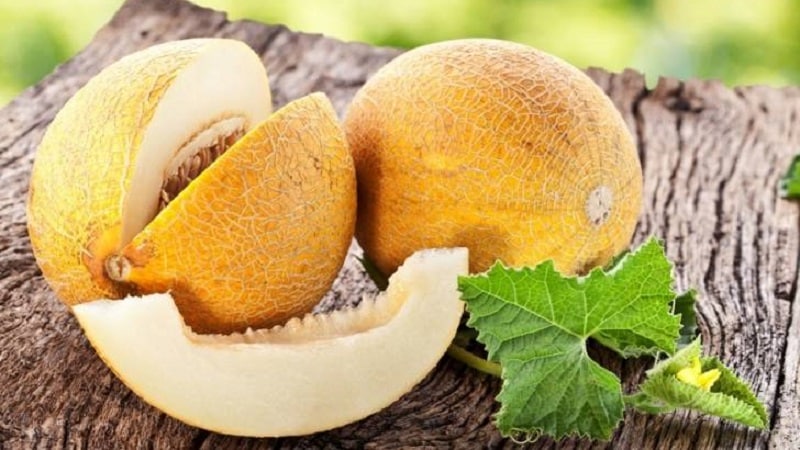Is it possible to eat melon if you have gout and what are its benefits?
Treatment of gout is long-term and complex. Diet plays an important role in the treatment of patients. Proper nutrition helps normalize uric acid production and improve overall health. A varied, nutritious diet is recommended, with priority given to foods of plant origin and dairy products.
Melon is especially useful for gout. It affects the metabolism of purines in the body, acts as an antioxidant, a diuretic, removes toxic metabolic products from the body, and prevents the deposition of uric acid salts. In the article, we will look at the beneficial properties of the product for the treatment and prevention of gout, how to use it correctly and in what quantity, so as not to harm the body.
Briefly about the disease
Gout is a rheumatic disease caused by the deposition of monosodium urate crystals in various tissues.. The disease is based on metabolic disorders: increased synthesis and decreased excretion of uric acid and its derivatives - acid urate salts in the urine. The level of uric acid in the blood increases, urate crystals accumulate in the tissues, then in the kidneys, causing acute inflammation.

Factors in the development of the disease include: heredity, obesity, diet, excessive consumption of alcohol, meat, inactive lifestyle. Gout can be secondary and develop in conditions of concomitant pathologies such as diabetes mellitus, metabolic disorders, arterial hypertension, psoriasis, leukemia, and blood diseases.
In the early period there are no specific symptoms. As the disease progresses, attacks of acute arthritis appear, alternating with asymptomatic periods. Gout attacks are manifested by acute, sharp pain in the area of the metatarsophalangeal joint of the first toe, local fever, swelling and redness of the skin over the joint, and impaired motor functions. After 4-10 days, the attack passes with the disappearance of accompanying symptoms and restoration of motor activity. Repeated relapses are possible after several months or even years, but each time the intervals between gout attacks become shorter.
The main goal of gout treatment is to reduce the concentration of uric acid, both in blood and urine. To achieve optimal results, it is recommended to combine pharmacological and non-pharmacological treatment approaches. Patients need to be prescribed non-steroidal anti-inflammatory drugs and urate-lowering drugs. If relief does not occur, glucocorticosteroids are administered intramuscularly.
All patients are prescribed a diet that excludes the consumption of offal, fatty meat broths, red meat, legumes and vegetables, and salt.. It is allowed to eat eggs, low-fat fish, meat, poultry, low-fat dairy products, some vegetables, fruits, and berries. Nutritionists recommend including watermelons and melons in your diet. Melons have a diuretic effect, which accelerates the process of removing uric acid from the body.
Read also:
Melon is a berry, fruit or vegetable
Is it possible to eat melon if you have gout?
Melon has long been successfully used for the treatment and prevention of diseases of the musculoskeletal system.. It is especially useful for gouty arthritis, as it has a multifaceted effect on the pathological process: it suppresses inflammation, reduces fluid content in tissues, normalizes metabolism, and is a good antioxidant and diuretic.

With regular consumption, you can achieve positive dynamics in the treatment of gout in a shorter period of time., reduce the need for medications. Melon is recommended to be included in the diet to prevent rheumatic diseases and complications.
Like all products, melon has contraindications, which are important to first identify and exclude.. To obtain the maximum benefit for the body without the threat of adverse reactions, it is important to consume fruits in moderation and only after consultation with your doctor. The question of whether it is possible to eat melon during gouty arthritis is decided individually, taking into account the patient’s age, the presence of concomitant pathologies, the characteristics of the development of the disease and the dynamics of treatment.
Reference. Melon is mainly consumed fresh after removing the peel, and is also dried, dried, canned, and processed into juice, honey, and candied fruits. The seeds are also used as a medicine.
Properties for illness
The healing properties of melon are determined by its unique chemical composition, thanks to it affects different aspects of the development and course of gouty arthritis:
- ascorbic acid - has a metabolic effect, accelerates tissue healing, participates in the formation of collagen and steroid hormones, maintains normal permeability of capillary walls, stimulates the secretion of bile, strengthens the immune system, inhibits inflammation;
- fiber - cleanses the body of waste and toxins, normalizes blood sugar levels, reduces cholesterol concentrations, maintains normal intestinal microbiocenosis;
- vitamin B8 - improves the transmission of nerve impulses, restores and maintains liver function, neutralizes cholesterol, starts the gastrointestinal tract, activates lipid metabolism, lowers high blood pressure, which is especially important when gout develops against the background of hypertension;
- carotene - regulates protein synthesis, normalizes metabolic processes, is necessary to improve the properties and composition of bone tissue, and is a good antioxidant;
- folic acid (vitamin B9) - ensures the normal functioning of the immune system, participates in the metabolism of purines, amino acids, the synthesis of nucleic acids, hematopoiesis processes, supports the health of new cells in the body;
- nicotinic acid (vitamin B3) - improves the state of tissue metabolism and microcirculation, reduces swelling, normalizes blood lipid composition, reduces cholesterol levels, regulates the metabolism of purines, amino acids, fats;
- Vitamin D - ensures normal bone development, prevents softening of bone tissue, affects general metabolism, promotes calcium deposition in bones;
- vitamin E - protects against the formation of free radicals, supports metabolic processes in skeletal muscles, improves immunity, normalizes weight, reduces blood glucose levels;
- vitamin K - improves absorption and regulates the level of calcium in the blood, normalizes metabolism in connective and bone tissue, is necessary for the normal functioning of the liver, kidneys, and gall bladder;
- iodine has a beneficial effect on protein and lipid metabolism, enhances metabolic breakdown processes, and has anti-inflammatory, antiseptic and local irritant effects.
Systematic consumption of melon for gout saturates the body with micro- and macroelements: sodium, potassium, calcium, magnesium, phosphorus, iron, manganese, copper, selenium, fluorine, zinc.
Benefits and harms
Melon has a general beneficial effect on the body, the functions of the musculoskeletal system. It is a source of vitamins A, B, C, E, K, PP, micro- and macroelements necessary for the normal maintenance of vital processes in organs and tissues.
Melon has anti-inflammatory, analgesic, tonic, antiseptic, diuretic, antioxidant effects, and to a lesser extent has a laxative effect. Consumption of the sweet fruit helps to compensate for iron deficiency, improve the degree of its absorption, and has a positive effect on the composition and properties of the blood.
Melon is included in the diet for diseases of the cardiovascular, digestive, nervous, and urinary systems. It normalizes metabolism, removes chloride salts and excess fluid from the body. Due to the presence of fiber in the composition, it cleanses the digestive tract well, while it contains practically no fat, activates lipid metabolism, which promotes weight loss.
Melon has a calming effect on the nervous system, relieves anxiety, and normalizes night sleep., improves mood, improves the condition of skin, hair, nails, strengthens the immune system.
Negative reviews about the dangers of melon for the body are rare.. They are associated with excessive consumption or individual intolerance to the product. Melon can be harmful when combined with dairy products and alcoholic beverages. Breastfeeding mothers should treat melon with caution, as it can cause digestive problems in the baby.
About the beneficial properties of other crops:
Effect on uric acid
Biologically active components in melon fruits affect purine metabolism: reduce the level of concentration of uric acid salts, prevent the formation of urate deposits in the body tissues and the renal system, promote their dissolution, and have an analgesic effect.

When treating gout, melon is used for its diuretic effect.: it disrupts the absorption of chlorine and sodium ions in the kidney tubules, increases the rate of urine formation and increases their excretion in the urine. As a result, the volume of fluid filling the intercellular spaces in organs and tissues decreases, and the swelling subsides.
Reference. Today there is no consensus on what a melon is - a berry, a fruit or a vegetable. According to culinary and botanical classification, melon is defined as a fruit: it has a sweet taste and is found in fruit salads, desserts, and drinks. Biologists classify melon as a vegetable crop, since it grows on herbaceous plants, has a long stem, belongs to the pumpkin family, and is related to cucumber, pumpkin, and squash.In addition, melons are characterized by the characteristics of berries: thin skin on the outside, hard seeds inside, juicy center, so we cannot exclude the possibility that melon is a false berry.
Rules and norms of consumption
The daily intake of melon depends on the age of the patient, the characteristics of the course of the disease, the presence of concomitant pathologies, and the state of the digestive system. Nutritionists advise using the product as a snack between main meals, without drinking water, milk, juice, etc. The average daily intake is 200-300 g.
A one-day fasting day on melon involves 6-8 doses of the product, 200-300 g each, but no more than 1.5-2 kg in 24 hours. This diet is considered strict due to its low calorie content, so it can be used no more than once every two weeks.
Advice. It is not recommended to eat melon out of season or at the beginning of sales due to the risk of high levels of chemicals and nitrates, which are used to accelerate the growth and ripening of the fruit.
Contraindications
The list of contraindications is limited to a history of allergies to the product, diabetes mellitus and dyspepsia (digestive disorders). However, in order to avoid possible adverse reactions in the form of a local allergic reaction, before consuming melon, you should consult your doctor.

Conclusion
Proper nutrition and fortification of the diet are of great importance for gout. Nutritionists name watermelons and melons among the must-have foods. Their regular use enhances the effect of diuretics, relieves pain and inflammation, and increases motor activity. However, to achieve positive dynamics in the treatment of gouty arthritis, conservative therapy in combination with diet is important.